The fight for rights: why we must defend strikes, boycotts and protests
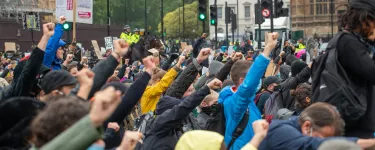
Our rights to assemble, to organise, and to demand better from the UK government are being restricted by several new pieces of legislation. The Strikes (Minimum Service Levels) Act undermines hard won workers’ rights and seeks to silence those who challenge the UK government’s broken economic policies. The Police Crime Sentencing and Courts Act (otherwise known as the ‘Policing Bill’) and the Public Order Act severely restrict the right to protest in the UK. And a newly proposed anti-Boycott Divestments and Sanctions (BDS) law would make it illegal for public bodies, like local councils, to make ethical decisions on how to spend and invest their money if these decisions are not aligned with UK government foreign policy.
These three pieces of legislation may seem separate, but there is a common thread between them: strikes, protests and boycotts have all historically been highly effective tools for demanding and creating change.
Right to strike under threat
Over the past year, strike action has been all over the headlines, as public sector workers in the UK have fought back against years of real term pay decreases and cuts to public services. Rising poverty and inequality, driven by soaring inflation and energy bills — even as energy companies continue to post record profits1
— have been a key factor in workers taking strike action to demand fairer pay and conditions.
Transport workers, teachers, nurses, postal workers and ambulance drivers are just some of the many workers who have taken strike action in recent months, leading to the UK’s biggest mass strike in over a decade as nearly 500,000 workers formed a united front2
and withdrew their labour on 1 February 2023.
The UK government’s new anti-strike law, passed in July 2023, makes it easier for bosses in our health, education, fire, ambulance and rail services to shut down strikes — by bringing injunctions, claiming financial damages against unions, and even sacking striking employees.
The new law supposedly aims to ensure “minimum service levels” are maintained on strike days, but in practice there were already several mechanisms in place to ensure this — that place considerable restrictions on the right of public sector workers to take strike action. The threshold for strike action in the UK was already higher than in many countries around the world. The new measures put a huge amount of power into the hands of UK government ministers — and could mean that strikes are so heavily restricted that they are ineffective.
Throughout history, strike action has been a crucial tactic for workers in securing fair pay and working conditions. From the striking workers at the Grunwick Film Processing Plant,3
which saw a huge movement grow to defend migrant workers, to the Dagenham sewing machine plant workers,4
whose brave actions led to the Equal Pay Act.
And this isn’t just about the UK. It is through collective bargaining and workers’ right to strike that War on Want partners in garment workers’ organisations have been able to secure pay rises and legally-binding contracts on safety standards in South Asia — to stop disasters such as the Rana Plaza factory5
collapse in Bangladesh in 2013 from ever happening again. If the UK government believes in human rights, it should repeal this law and advocate for workers' and trade union rights both in the UK and around the world.
Right to protest: beyond the policing bill
In 2022, after many months of parliamentary back and forth, the Police, Crime, Sentencing and Courts Act (PCSC Act) was introduced as law. Through this legislation, the government is seeking to put significant limitations on protests and gatherings, introduce increased police powers for protest policing, and bring in tougher sentencing for certain protest-related offences. However, thanks to the efforts of hundreds of thousands of people — including thousands of War on Want supporters — who wrote to MP’s, took part in online actions and gave up their time to attend demonstrations all over the UK, the House of Lords removed some of the worst anti-protest proposals from the so-called ‘Policing Bill’ before it became law.
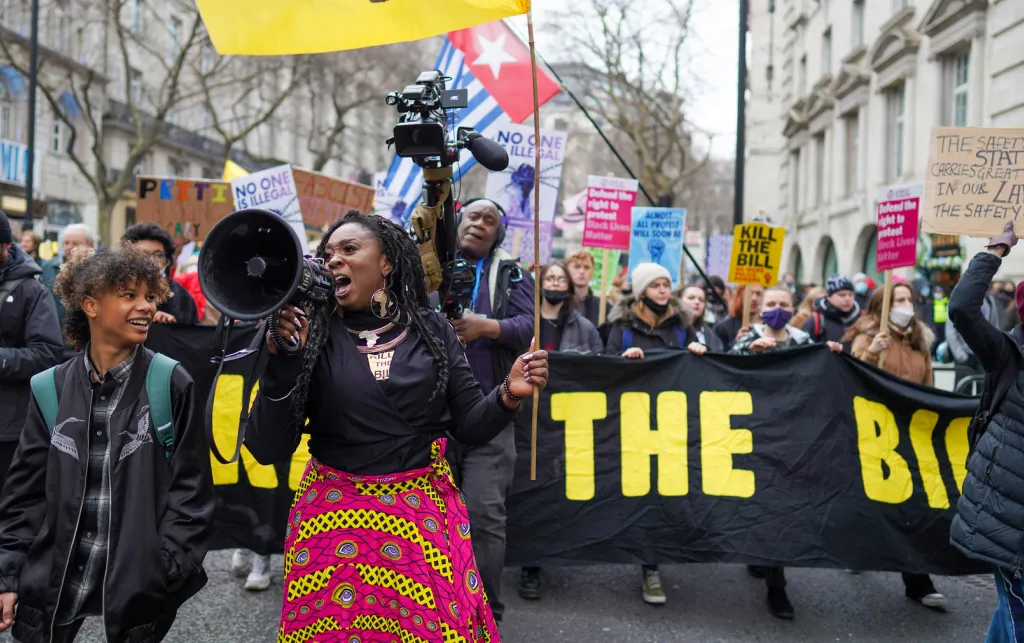
Now, the Government has forced through the Public Order Act, a renewed attack on our right to protest, resurrecting many of the anti-protest proposals rejected in the previous policing bill, and in some cases making them worse.6
Both the PCSC Act and the Public Order Act are huge threats to democracy. The right to assemble, which allows us to peacefully protest, is vital to any democratic society, and has been central to social change and progress throughout history. Protest rights are enshrined in law through Article 11 of the European Convention on Human Rights — and enacted through the UK’s own Human Rights Act.
Right to boycott: from South Africa to Palestine
Against this backdrop of anti-strike and anti-protest legislation, the UK government is also planning to introduce a bill banning ‘Boycott, Divestment and Sanctions’ (BDS) — an anti-BDS bill — that would severely impede social movements campaigning for justice. This bill aims to stop public bodies from making ethical decisions about their investments, purchases and procurements if these contradict UK government foreign policy.
This would undermine the ability of our councils to act in line with international law and human rights concerns. The anti-BDS bill explicitly targets the Palestinian-led BDS movement, which calls for boycott, divestment and sanctions to hold Israel accountable for violations of international law against the Palestinian people through its occupation and apartheid regime. It is an attempt to delegitimise the BDS movement and create a ‘chilling effect’ to deter campaigns for Palestinian rights.
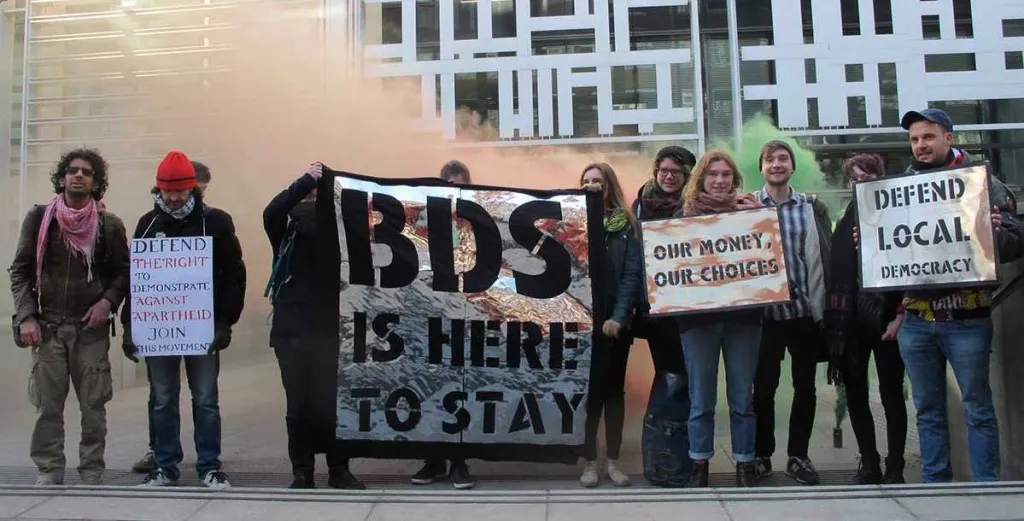
The proposed bill will also impact on our broader ability to campaign on social and climate justice. The tactics the UK government are trying to ban are central features of international solidarity campaigns calling for accountability for human rights-abusing regimes and arms dealers, as well as climate justice movements taking aim at fossil fuel companies.
This is not the first time the UK government has tried to crackdown on BDS. In 2016, it tried to stop local councils making their own pension investments in line with ethical judgements. Thousands of War on Want supporters joined with campaigners working on a huge range of issues to push back against the bill. As a result, the government’s attempts to block BDS were ultimately defeated twice in court by judicial reviews, supported by War on Want, that ruled the guidance was unlawful. Now, seven years later, they’re trying again.
From the Bristol bus boycotts7
against racial discrimination, to divestment from fossil fuel companies and sanctions against apartheid South Africa, BDS campaigns have a rich legacy of peacefully winning progressive social change. They have been crucial campaigning tactics both in the UK and worldwide — a critical right that should be unconditional in a democratic society.
Why are these bills being introduced?
It is no coincidence that anti-protest measures were introduced following an upsurge in mass protest action — from the demonstrations demanding racial justice, led by the Black Lives Matter movement, to the mass mobilisations demanding climate justice that have swept the UK in recent years.
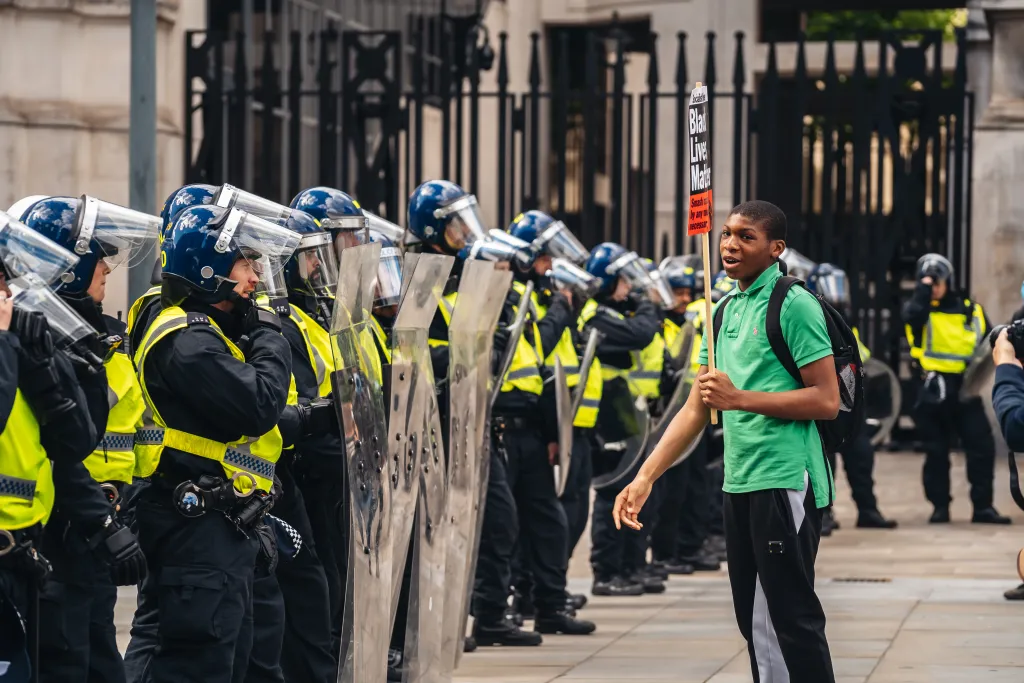
Similarly, anti-strike measures have been introduced at a time where we are seeing unprecedented public sector walk outs in the face of rising inequality and real term pay cuts. If the UK government wants to solve those problems, it should be getting around the table and having meaningful discussions with workers and trade unions to find solutions to deepening poverty and inequality. Instead, it is undermining the vital role of unions in representing and fighting for the rights of workers.
The proposed anti-boycott measures, having previously been defeated in the courts, are being reintroduced after an intensely violent 12 months for Palestinians and an upsurge in Palestinian solidarity. From the sustained legal challenge to the prior iteration of this legislation, to the hundreds of thousands of people who have taken to the streets in solidarity with Palestinians in recent years, it should be clear to the government that there is mass opposition to its proposals.
The government can clearly see that protests, strikes and boycotts are all highly effective tools for people to speak out and demand justice. Instead of cracking down on these vital freedoms, government minsters should be listening and taking meaningful action on these issues.
These new laws are profoundly anti-democratic. They form part of a wider trend we are seeing from the UK government, and governments around the world, towards restricting human rights and the space in society to speak out against injustice, to organise for change in their communities, and to contribute to a functioning democracy.
The fight for our rights
It is essential that we continue to fight back against this unprecedented attack on our rights. We need to let those in power know that we will not allow our freedoms to be eroded. War on Want has always stood in solidarity with those defending their rights, both internationally and in the UK, and we will continue to do so in our fight for global justice.
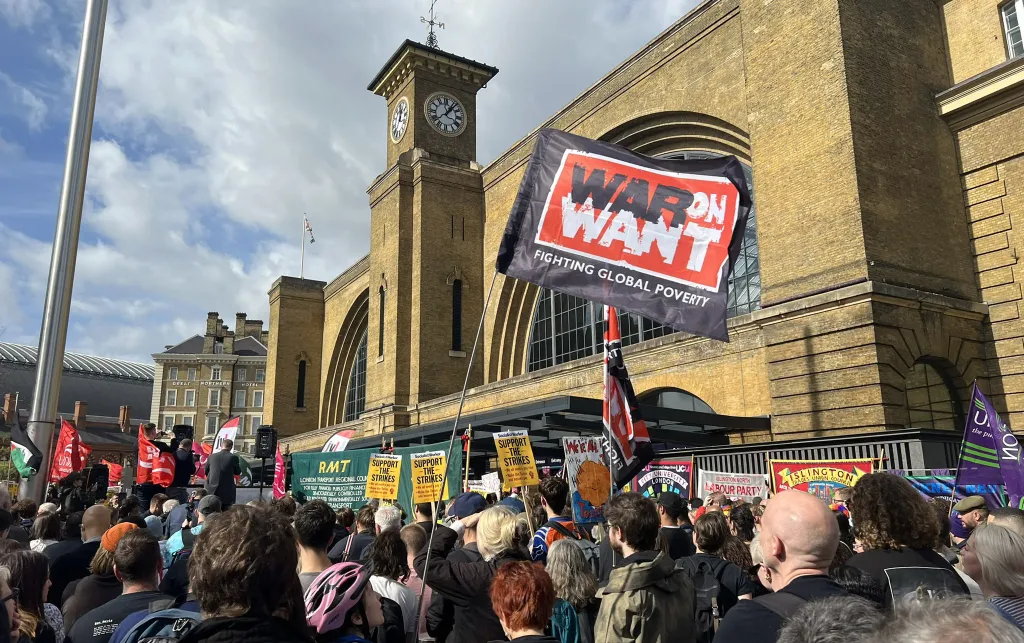
War on Want’s work, and the work of our UK and global partners, is to create a more just society and an end to poverty and human rights abuse, through building the collective power of grassroots movements. This work is profoundly threatened by the attacks on our right to strike, our right to boycott human rights abusing companies and countries, and our right to protest.
However, history shows us that if enough of us come together we can fight back against threats to our rights – and the past legal victory against the previous attempts to bring in anti-boycott laws demonstrates this. Now, campaigners are working hard to ensure those protesting know their rights8
with a view to build legal challenges against policing that is in contravention of international human rights conventions. Alongside this, a broad coalition of unions and organisations are working to repeal the new anti-strike legislation. It is critical that we do not allow these curtailments of our rights to pass under the radar: we need as many people as possible to build their understanding of these issues and take action — to demonstrate that there is mass opposition to these attacks on our rights.
Share this page
- 1www.bbc.co.uk/news/uk-64489147
- 2www.itv.com/news/2023-01-31/half-a-million-workers-to-strike-in-biggest-day-of-industrial-action-since-2011
- 3www.bbc.co.uk/news/uk-england-london-37244466
- 4www.theguardian.com/politics/2013/jun/06/dagenham-sewing-machinists-strike
- 5www.waronwant.org/news-analysis/rana-plaza-never-again
- 6www.libertyhumanrights.org.uk/fundamental/protest-rights/
- 7www.blackhistorymonth.org.uk/article/section/civil-rights-movement/the-bristol-bus-boycott-of-1963/
- 8www.netpol.org/defend-dissent/